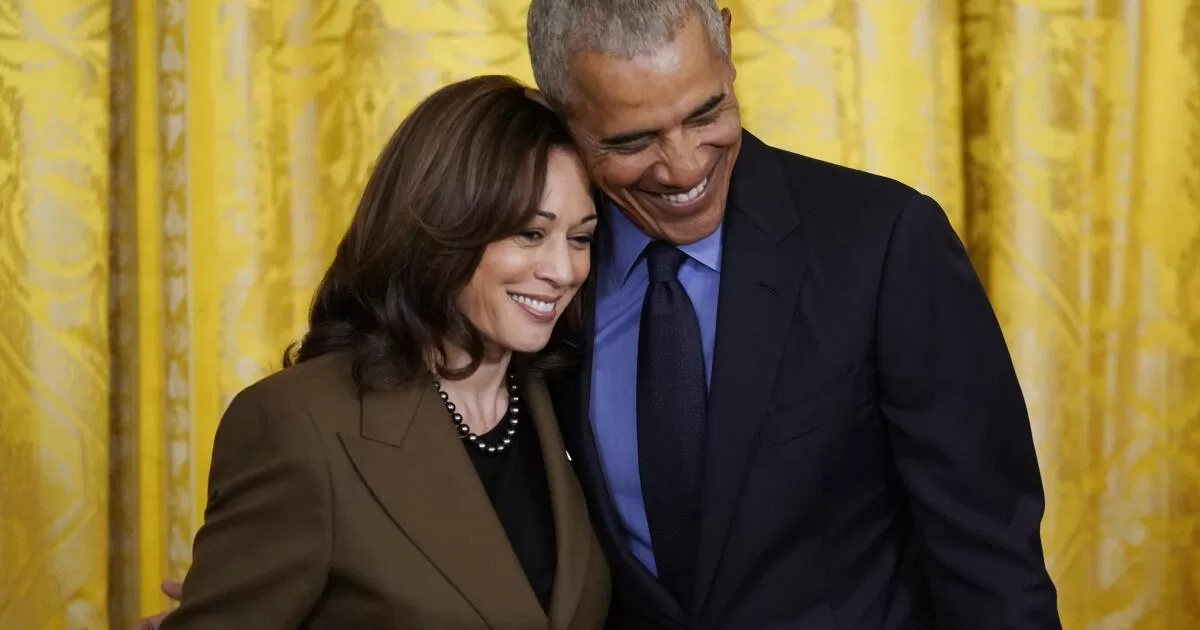Objectively, it is an amazing progression in a short window of time. In 2008, Barack Obama, a Democrat, became the nation’s first Black president. Sixteen years later, Kamala Harris is poised to become the first Black woman chosen by the party to be its candidate for president.
But much has changed in 16 years.
The defining significance of Obama’s historic candidacy, its brand, was hope. Just the symbolism of a Black man in the White House moved millions of us to think differently about ourselves. Harris’ ascension is no such symbol. She becomes the Democratic candidate because as vice president, she’s been handed the baton by an aging white man forced to step aside because of worries about his ability to get the job done.
In other words, Harris’ color is not nearly as important as her ability to do that job, not just to take President Biden’s place on the ticket but to take Democrats across the finish line. She must salvage the desperate, dwindling hope that the whole nation can regain its moral footing in the onslaught of MAGA recklessness and self-righteousness that’s eroding America’s shaky democratic foundations.
That’s a much bigger task than Obama had. During his candidacy the country also faced a crisis, the housing meltdown that led to the Great Recession. Certainly that shifted votes in Obama’s favor, though the hope that was at the core of his campaign retained its power. When he won, the joy and optimism that erupted around the country was about the triumph of “better angels,” not “it’s the economy, stupid.”
What Harris is facing is an existential crisis that may paralyze as much as it motivates. This election proceeds not from joy or hope, but from an anxious question: Can we ever again assume that whoever is in charge — not just Democrats — will be people of good will? There’s growing cynicism that Republican tricks, from voter suppression laws to a stacked Supreme Court that carves out criminal immunity for Trump, will just keep coming, regardless of the vote. Elections simply won’t matter.
Harris seems well-matched to this fraught moment. She wants to fight. Trump has made fighting central to his campaign, especially after the assassination attempt, although MAGA has always been belligerent, in-your-face, sneeringly dismissive of “wokeism.” Harris, a former prosecutor, is already in battle mode. She knows Trump’s type, as she’s been telling rally audiences, because she took on predators, fraudsters and abusers. She’s offering what the Democrats have badly needed: an avatar not of hope, but of give-em-hell.
Harris seems to relish the prospect. All of her past missteps and public struggles to convey a core ideology, as vice president and before that in her failed 2020 presidential campaign effort, may be forgiven if she leads with an obligation to punch back.
That it would be a Black woman punching back will be that much more satisfying. Trump is a racist who holds Black women in contempt, especially those who have dared to criticize or hold him accountable — Fulton County Dist. Atty. Fani Willis, federal Judge Tanya Chutkan, U.S. Rep. Maxine Waters. Harris would have a platform like no other. As a presidential candidate she would be on equal footing with Trump, his counterpart. And as a Black woman she would ably carry the legitimate anger of so many Americans — women, gay and trans people, poor people and immigrants — all of whom find themselves caught in the MAGA crosshairs.
For all the grimness and high stakes of the moment, there is undeniable magic. Harris had a golden career in California, rising from D.A. of San Francisco to state attorney general to U.S. senator with relative ease. She branded herself as a progressive, and while critics have taken issue with that, especially because of her actions as a prosecutor, she is, at the very least, a solid Democrat. Her 2020 primary campaign stalled her ambition only briefly; Biden chose her as his running mate, the first Black and South Asian woman to be on the presidential ticket of a major party. Having broken that barrier, she is set to break another in a sudden twist of fate.
That drama of it all does excite certain segments of the party, especially Black women, a key constituency that must turn out in order for the Democrats to have any chance at winning in November. The “Black woman phone call” that happened right after Biden’s withdrawal announcement catalyzed Harris’ unprecedented groundswell of financial support. The Zoom gathering, hosted by the organization Win with Black Women, raised $1 million in an hour, harking back to the infectious racial pride of Obama’s first campaign. A friend of mine who was on the call, which grew to include thousands more women than expected, described it as “truly something to behold.”
I have no doubt that it was. But I can’t forget that Harris is being rapidly embraced not so much for who and what she is, but for who and what she is not: Trump, and in a different way for different reasons, Biden. She is the likely Democratic nominee who will become a lifeline for us all, for progress itself, and if being of color makes her a better lifeline, that’s a plus. But of course we don’t know if it will be. What hasn’t changed over the last 16 years, what has only gotten uglier, is that race and gender divide.
There’s a lot of onslaught coming. Whether we beat it back depends less on Harris than on the “we” that is democracy’s real foundation.
Erin Aubry Kaplan is a contributing writer to Opinion and a columnist at Capital & Main.
